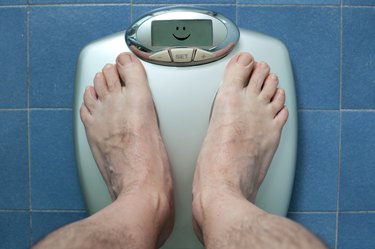
"Ideal" is almost impossible to define when it comes to a man's weight. A healthy "ideal" could be very different than the "ideal" weight that adorns a fitness magazine cover. Weight also varies according to height and body shape. Your body mass index, which is calculated according to the ratio of your height to your weight, gives you some idea of whether your weight is healthy or if you're carrying too much body fat. Instead of being fixated on an exact number, evaluate your eating, exercise and lifestyle habits to see if they support a healthy body.
"Normal" Weight Statistics for Men
Video of the Day
The Dietary Guidelines for Americans, published in 2010, bases calorie need computations on the "average" man. He stands 5 feet, 10 inches tall and weighs 154 pounds. A "normal" person of this height should weigh between 132 and 174 pounds. A "normal" weight person who is slightly shorter at 5 feet 8 inches weighs between 125 and 163 pounds; at 6 feet, 140 to 183 pounds; or at 6 feet 4 inches, 156 to 204 pounds. These weights are for both genders, so men will fall into the upper end of the range because they naturally have a greater proportion of dense muscle tissue. If your weight falls into these ranges, you might find your physique doesn't meet your ideal -- but it is considered healthy.
Video of the Day
Body Mass Index Calculations
Your body mass index can tell you if you're in a healthy weight range with a lower risk of disease. Use an online calculator or consult your doctor to determine your BMI according to your specific height and weight. A healthy BMI is between 18.5 and 24.9; a measure of 25 to 29.9 classifies you as having overweight; 30 or higher is considered having obesity.
BMI has serious limitations, though. It often categorizes highly muscular people, men particularly, as being too heavy. Muscle mass adds weight to your frame, even though it's healthy tissue that doesn't increase your risk of disease. It may also underestimate body fat and doesn't take into account where your body stores fat. Men can be of normal weight, but carry too much fat in their belly, which also indicates an increased risk of disease and compromised health. A man whose waist is greater than 40 inches may be at risk of health complications.
Body Shape Influences the Right Weight
People fall into one of three general body-type categories: endomorph, mesomorph or ectomorph. Which body type you have will influence the ideal weight for you. An endomorph may find it hard to achieve a six pack, usually carries a fair amount of stored fat and has a large bone structure. The ectomorph is long and lean; he often finds gaining muscle weight challenging. Mesomorphs fall right in the middle -- they gain muscle weight fairly easily with training and boast a fit-appearing build. The ideal weight for a stocky endomorph is quite different than the ideal one for a lanky ectomorph. You can't change your body's build, because it's based on genetics.
Focus on Healthy Living
You can naturally find a healthy weight for your body if you eat moderate portions of whole, unprocessed foods and stay physically active. The number of calories you need per day varies according to your size, activity level, body composition goals and age, so consult with a dietitian or use an online calculator to determine yours. Spread the calories out over three meals and two snacks daily. When you sit down to eat, make meals that consist primarily of lean proteins, whole grains and vegetables; snacks may include low-fat dairy, fruit, and nuts or seeds. Moderate your intake of sugary drinks and snacks, refined grains, saturated fats and alcohol.
Aim to exercise at a moderate intensity for at least 150 minutes per week, as recommended by the Centers for Disease Control and Prevention. You'll also want to do at least two muscle-strengthening sessions weekly to target all the major muscle groups. Exercising more than these recommendations makes you more successful at managing your weight and reducing your risk of disease. Sleep seven to nine hours nightly, which also helps regulate your weight and energy.
If you're after an "ideal" look that's similar to fitness models and hard-bodied actors, you'll have to spend a considerably greater amount of time at the gym and on planning your menus. Daily workouts and specifically portioned meals with the right ratio of macronutrients usually are required to achieve such goals.
- CNN: Defining the New Male Ideal
- Dietary Guidelines for Americans 2010: Chapter 2: Balancing Calories to Manage Weight
- Rush University Medical Center: How Much Should I Weigh?
- National Heart Lung and Blood Institute: Assessing Your Weight and Health Risk
- American Council on Exercise: How to Eat and Train for an Endomorph Body Type
- National Sleep Foundation: National Sleep Foundation Recommends New Sleep Times
- Centers for Disease Control and Prevention: How Much Physical Activity Do Adults Need?